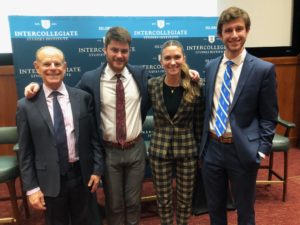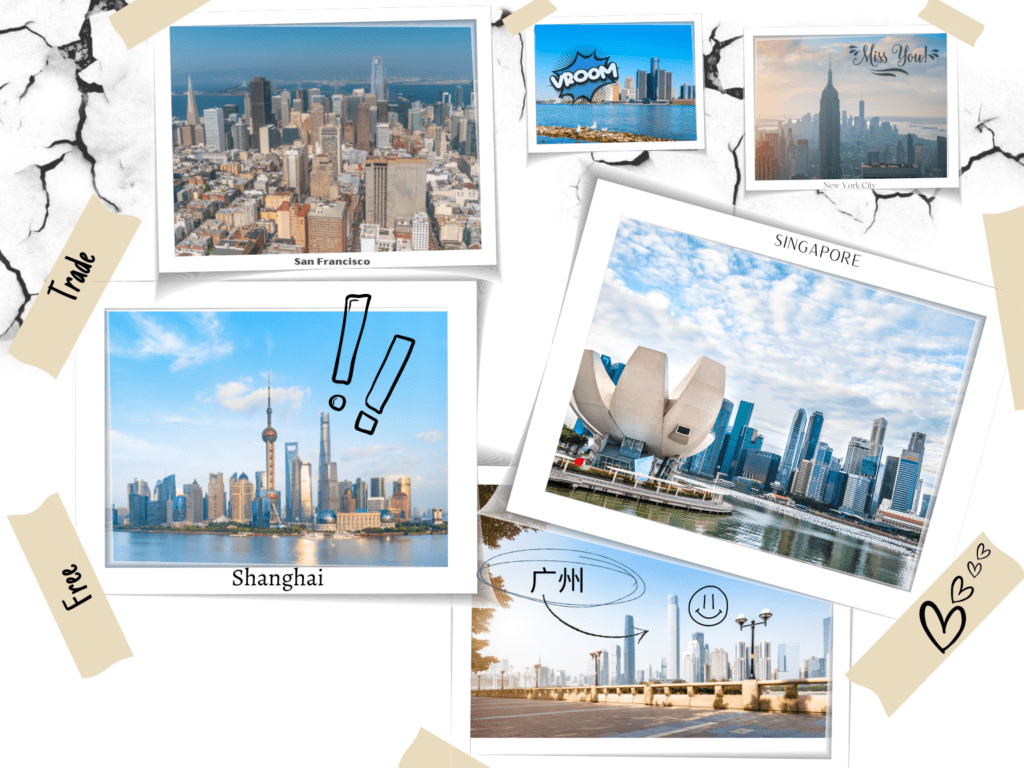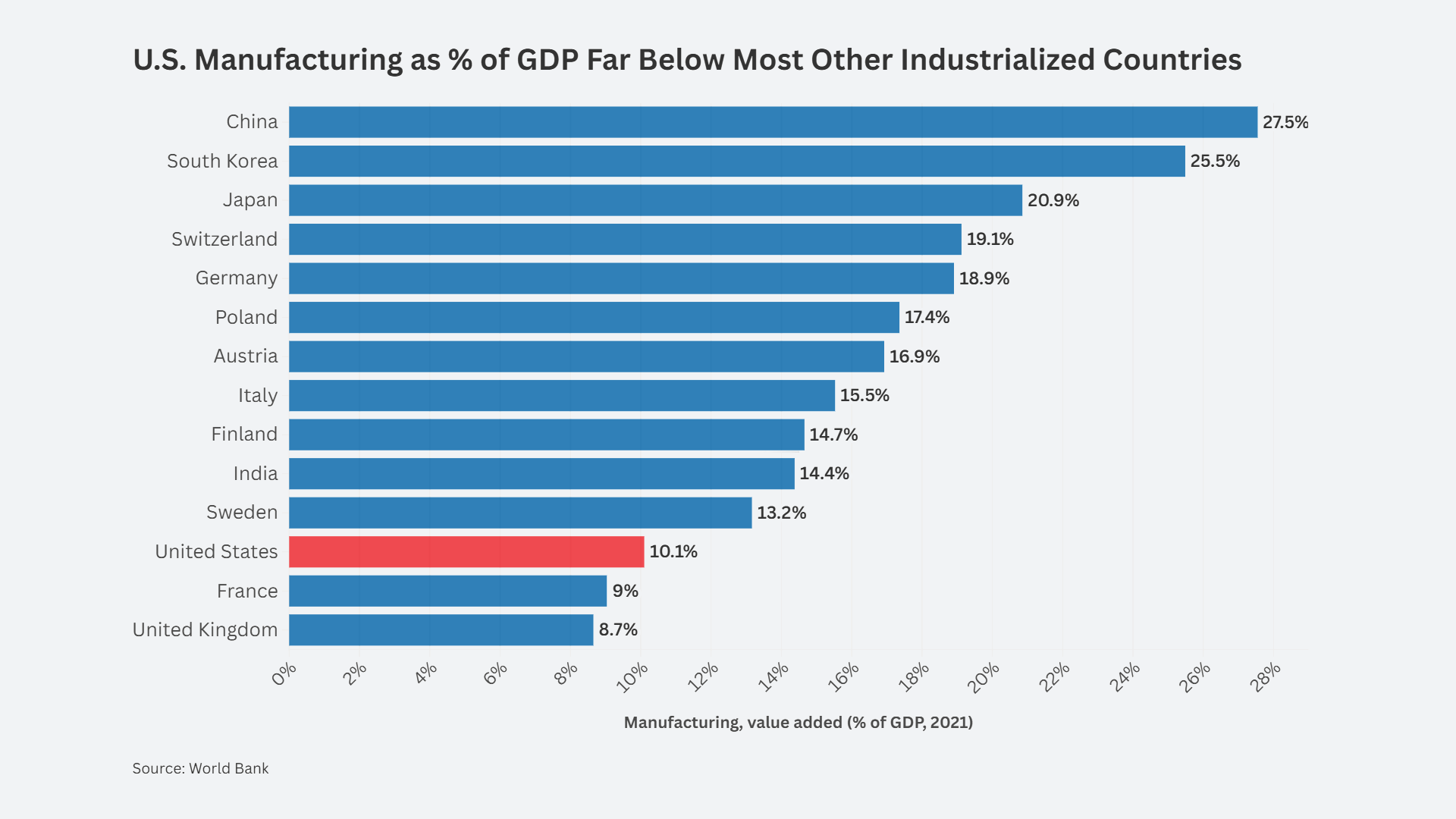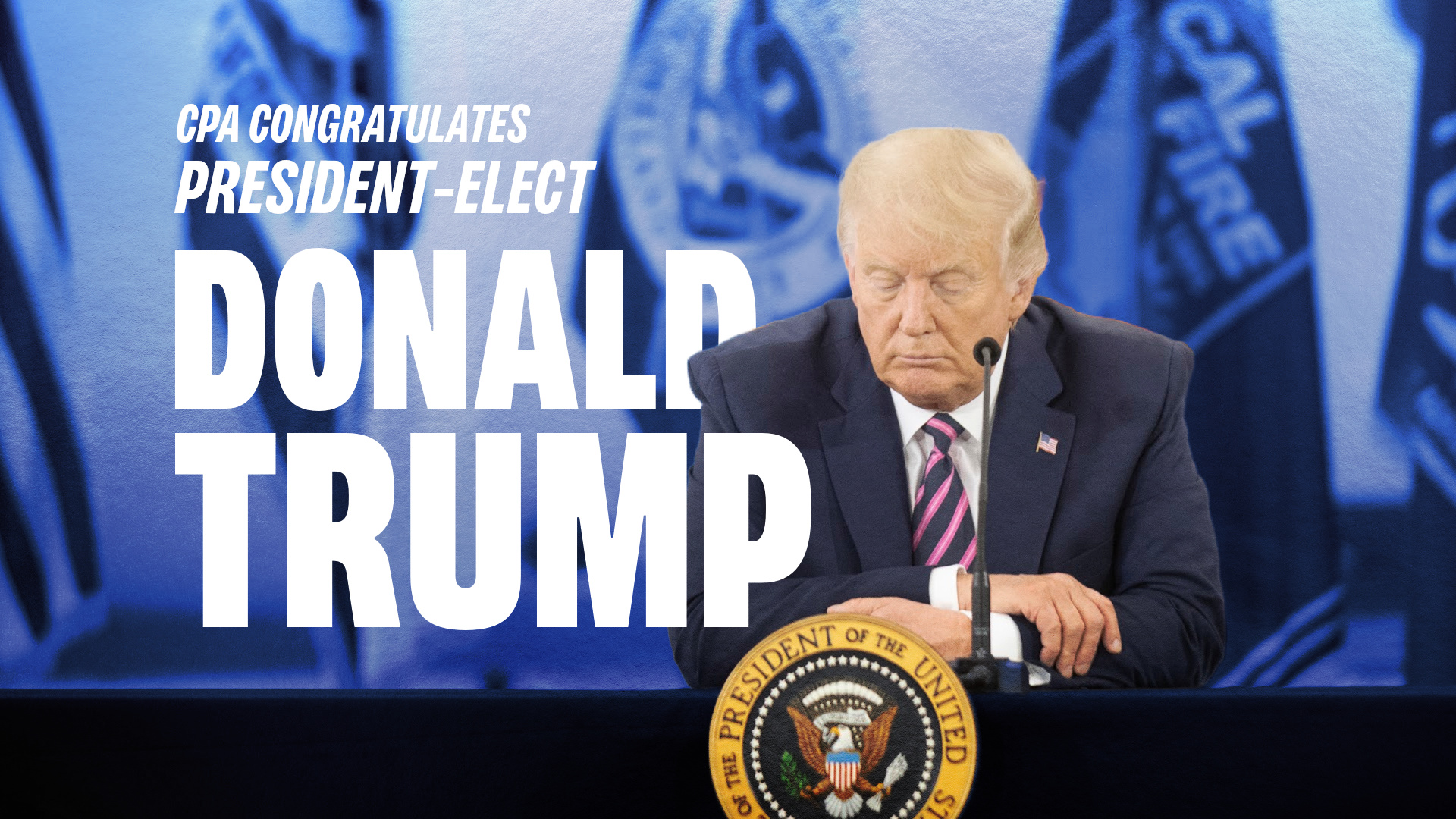What’s so great about free trade? Well, according to the International Trade Commission’s own admission – it makes big multinationals bigger, guts most of the domestic mid-supply chain companies that served those giants, and wreaks absolute havoc on non-college educated, blue-collar labor – especially women and minority men.
The other aspect of free trade is consumer choice and cost. We live in a consumer society, after all, and thanks to our trade with Mexico and China, American garages, basements, and side table drawers are full of gadgets and toys priced to perfection. Writing in her new book “Homecoming”, Financial Times columnist Rana Forohoor explains that one of the reasons why discount stores like Walmart and the Dollar Tree exist is because American consumers – having lost middle-class wage earning blue-collar jobs to offshoring – have had little choice but to turn to the corporate discount stores. These people have all been downsized.

Pepperdine University professor Julia Norgaard says that most people that lost their jobs to offshoring found in-kind jobs elsewhere, or moved and found better jobs. In a debate with CPA’s own Jeff Ferry on Wednesday evening organized by the Intercollegiate Studies Institute and the University of Wisconsin, Norgaard said protecting manufacturing jobs from imports was a bad idea.
“What if we protected, 100 years ago, metallurgy jobs to shield an industry that had no demand anymore? It is not incumbent on us to support industries that do not have demand. The job losses are definitely a shortcoming, but my question is do these jobs need protection at the expense of the American consumer? The government’s role is not to protect us. How effective has that been in the last few years? They don’t know how to protect us as individuals let alone to protect us from foreign threats,” she said.
The core of what was an often heated debate between Ferry and Norgaard centered on concerns about unfairness in only protecting industries plugged into the U.S. government through lobby firms and political donations; and whether the American consumer would suffer from higher tariffs.
Ferry said that his position, and that of CPA, was that free trade was fine, when fair. And that the U.S. economy is more than just selling low-cost consumer goods and service jobs.
As far as special interests go, tariffs or no tariffs, special interest groups will always play an outsized role in governance at both the federal and state level. It’s one way that groups of people and companies get their issues addressed by lawmakers; lawmakers who usually are not aware of a particular problem in a market, let alone be experts in a particular sector of the economy.
Ferry started off the debate by describing how he changed his mind about free trade.
“I used to believe in free trade as well. I used to work for Nortel, which was one of the largest makers of telecommunications equipment in the world at the time. But we had a policy to offshore our manufacturing which ultimately led to about 40 thousand people losing their jobs. I remember speaking to our manufacturing executives about the people in Thailand and Malaysia who were now going to make the equipment that was once made in the U.S. and Canada. I asked about the ability of Thai and Malaysian workers to assemble our telecom products. Since we were paying them about a tenth of what we paid American workers I wanted to know if they were 10-times less productive than our American staff,” he said. “But the answer was that they worked just as hard as American workers and produced just as much. They said these people were so happy to have these jobs and that they were really dedicated. The productivity was the same. The quality was the same. That was the point where I began to question free trade theory. Because in economics, a worker who makes 10 times more money should be 10 times more productive. I began to see that the U.S. economy was a high-income economy for reasons specific to the U.S. and all that could be endangered by so-called free trade with poor countries. Thirty years ago, that equipment was made here. It was a growth industry. It paid well. Now it’s gone. All of that telecom and Internet equipment is made in Asia.”
Here are some excerpts from Wednesday’s debate.
***See the full debate here. ***

CPA chief economist with Jeff Ferry, debate moderator Nate Hochman and Pepperdine economics professor Julia Norgaard.
Moderator: Tariffs benefit special interest groups that are more politically connected. Free trade is more egalitarian, rather than one in which the control over import and export is governed by bureaucrats and also subject to special interests.
Jeff: I agree that there is always a danger of special interests taking over government policy on an industry. But consider this: In 2018, we had steel tariffs imposed, and steel prices rose briefly. But later in 2018, steel prices began to fall and in 2019 they were below the pre-tariff levels. What happened was that American steel companies invested and began building new steel mills and became more aggressive to win the steel business in the U.S. So prices fell because you had more competition. You had more investments, and that meant more jobs, well-paid six-figure income jobs in many cases.
Moderator: The debate over tariffs is more contentions right now on the American right than on the American left. Why is that?
Jeff: I think that is because the American left is talking more to the upper middle-class constituency and the American right saw that as an opportunity to go after labor. Trump as a businessman grew up in the 1970s and 1980s when you had Japanese manufacturers making a big impact on the U.S. market; the machine tool industry was dying, the steel industry was losing workers, and most of the mainstream politicians in DC said it was fine because with global trade growth, everyone would gain. But what happened was you had all these working-class people who did not gain and when you lose your job and you see the devastation in a place like Youngstown Ohio, and the politicians are telling you that everybody is gaining, you become disenchanted and angry. And Donald Trump recognized that and saw the opportunity. Many workers stopped listening to the traditional political leaders, right and left. And economically, the U.S. does not gain if we let China make everything; that’s how I feel.
Julia: What is central to this tariff discussion is what we mean about the trade deficit – you have a trade deficit with the store where you buy your clothing. The fundamental principle is the same about individual states. Is Wisconsin worried about selling less to Ohio than it buys? It doesn’t matter. These are decisions made by consumers. When we run a trade deficit, foreign countries are holding our money. They are going to either invest in our securities or buy more of our goods and services, which is instrumental in driving wealth for individuals.
Jeff: The U.S. has run a trade deficit for 45 consecutive years. No country in the world has done that except possibly Rome in the days of the Roman Empire. China is running a trade surplus, which is hollowing out our industry. And let me tell you: the Law of Comparative Advantage says every nation will always have a comparative advantage in something. Well, that is not true if your currency is overvalued. If your currency is overvalued, which the dollar is today, then you can have an advantage in no goods at all. Today, almost every industry in America that competes with foreign imports is at a disadvantage. The dollar is today overvalued in my opinion by around 30% which is a huge disadvantage for U.S. industry.
Julia: Yes, we have had a deficit for 45 years, but did this mean the U.S. trade deficit is going to nose-dive our economy? No, we are a huge economy and a growing and prosperous country. There is a nostalgia around things like steel and agriculture. It’s sad when someone loses their job. But the manufacturing sector in the U.S. is like 11 percent of the economy and services is like 70 percent. That is what is driving our success and prosperity.”
Ferry of course disagreed. Here is more on that in a recent Q&A with CPA’s chief economist.
Moderator: Can protectionism go too far?
Jeff: I don’t like the word protectionism because it sounds negative. What I think about is a growth strategy. We had an economy growing at 3% per person per year for decades up to 1970 and since 2000 we have grown at around 1% on average. That’s chiefly because we have allowed most of our manufacturing production to leave and go to Asia, mostly China. We need to cut imports by a third to balance trade. If we did that we would still be the world’s biggest importer. But we would then be building our industrial base, and that leads to higher wage growth.
Audience: After manufacturing left in the Midwest, we saw a lot of the social fabric eroded. Are better economic trends worth those social costs we see?
Jeff: This is why you need a long-term view of the economy. You have 200 million people that want to work in this country and the average IQ is by definition 100. People talk about Google but at Google, they hire the top 2% of those who apply for jobs there and those who apply for jobs are already from elite schools. Google cannot employ, nor can the entire internet industry employ, the 200 million Americans that want jobs and need jobs. A well-run manufacturing company is going to provide a worker with income, and a community with economic stability that you’re not going to get from a new Dollar Tree going up, or restaurants full of part-time workers. I agree people want low-priced stuff. But we also must consider how our economy can provide for people.
If 1,000 steelworkers lost their jobs due to imports and were earning an average of $50,000 a year, free trade theory expects, and requires, that they must all be able to move into other industries and earn at least the same wage (or more) and generate the same value (or more) in their new employment in other industries. In free trade theory, from a financial perspective, all industries are the same. But the problem with free trade is that all industries are not the same. Some industries generate much higher-value output than others. And those industries that generate higher value tend to pay higher wages.
Norgaard’s push for new tech made sense, but witness the recent bloodbath at Twitter and Facebook, where thousands will be laid off in areas of Silicon Valley where the average home goes for nearly $1 million. If they cannot get a similar job at the same rate of pay they will have to move. Working as a store manager at Target and shopping at the new Dollar Tree in town won’t suffice for the Bay Area to thrive.
To her point, she said that raising tariffs across the board would take a yeoman’s effort. She was against such moves. There are tariff rates on over 4,000 items imported here, many of which are not of any particular national security interest. We probably don’t need higher tariffs on French chocolate or need to make life easier for companies who make plastic casings for pool filters. But when it comes to national security, there are obvious sectors that come to mind that warrant special treatment – be it critical medications mostly all sourced from abroad, or our transition to green energy, of which China plays an outsized role. Tariffs level the playing field, Ferry said.
“Nations get rich through growth industries,” Ferry said.
All one has to do is think of the last few decades in China. China didn’t become the modern, landscape full of bullet trains and new skyscrapers because of noodle shops and environmental consultants. It became richer faster because it was making a lot of money by making a lot of things for the Western consumer – from sneakers to smartphones, solar panels to LED lights.
Only recently has China grown richer via high tech and to a lesser extent, finance.
In some sectors of the global manufactured goods economy, China companies are now No. 1. In the smartphone space, China brands are now outselling American brands like Apple and Motorola, and even South Korea’s Samsung in many countries around the world, from Mexico to India. China manufactures its own global brands like Huawei and Xiaomi, and they make iPhones. China’s technological expertise in producing smartphones will make their smartphone brands the world leaders not only in Asia but in Africa and Latin America and – increasingly – Europe.
“We must trade. But we have to do it in a way that allows us to expand our industrial base and maintain our technological lead,” said Ferry. “Not just in R&D, but in our manufacturing, too.”













